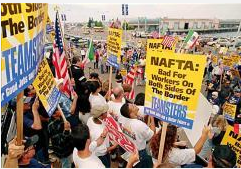 Since the North American Free Trade Agreement (NAFTA) was signed by the governments of the United States, Mexico and Canada in 1994, millions of Mexicans have joined the ranks of the hungry. About one-fifth of Mexican children currently suffer from malnutrition. The Mexican government reports that the number of people living in food poverty, the inability to purchase a basic food basket of staple foods, has risen over the last few years from 18 million in 2008 to 20 million in 2010.
Since the North American Free Trade Agreement (NAFTA) was signed by the governments of the United States, Mexico and Canada in 1994, millions of Mexicans have joined the ranks of the hungry. About one-fifth of Mexican children currently suffer from malnutrition. The Mexican government reports that the number of people living in food poverty, the inability to purchase a basic food basket of staple foods, has risen over the last few years from 18 million in 2008 to 20 million in 2010.
To see the affect NAFTA has had on the local economy you need only look at their rising import costs. Forty two percent of the food consumed in Mexico comes from abroad. Before NAFTA, the country spent USD $1.8 billion on food imports—today it spends $24 billion. The rise of imported corn has caused the price of locally grown corn to fall by half, which has forced nearly two million farmers off their land. With their livelihoods gone, the farmers are forced to look for work elsewhere in order to support their families. Many of these farmers seek refuge in the United States as migrant workers. As more corporations replace small farmers, the impact of NAFTA on communities has been devastating.
According to Jonathan Fox, an expert on rural Mexico at the University of California, Santa Cruz, “[NAFTA] unravels rural communities, separates families and makes it difficult for young people to see a future in their communities of origin.” Have you heard of other ways NAFTA is negatively affecting trade? Bryan Dorval is a media and communications intern for Nourishing the Planet. Photo Credit: Denis Pornoy (Farmers in Mexico protesting against the unfair regulations enforced on them by NAFTA).

Danielle Nierenberg, an expert on livestock and sustainability, currently serves as Project Director of State of World 2011 for the Worldwatch Institute, a Washington, DC-based environmental think tank. Her knowledge of factory farming and its global spread and sustainable agriculture has been cited widely in the New York Times Magazine, the International Herald Tribune, the Washington Post, and
other publications.
Danielle worked for two years as a Peace Corps volunteer in the Dominican Republic. She is currently traveling across Africa looking at innovations that are working to alleviate hunger and poverty and blogging everyday at Worldwatch Institute’s Nourishing the Planet. She has a regular column with the Mail & Guardian, the Kansas City Star, and the Huffington Post and her writing was been featured in newspapers across Africa including the Cape Town Argus, the Zambia Daily Mail, Coast Week (Kenya), and other African publications. She holds an M.S. in agriculture, food, and environment from Tufts University and a B.A. in environmental policy from Monmouth College.








